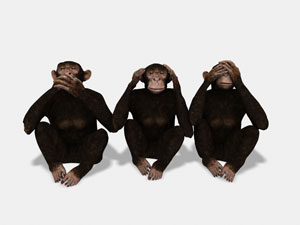You can have “all the money in the world,” yet still not be in control of your health, or your relationships, or your family’s well-being, or your emotional and intellectual fulfillment. This is hard to remember in a professional environment since everyone’s “value” seems to be based on production: how much money the individual generates for the company, the size of his office, the office view, the parking space, the alliances, the title, the number of assistants, the base compensation and ... Continue Reading
Lack of Morality Breeds Mistrust
For all the good in money, there is also a flip side. Money does not guarantee happiness, self-esteem, pride, achievement, or emotional intimacy. Money does not necessarily correlate with integrity and honor. Money can be a creative tool, but when you become obsessed with it to the extent that you judge yourself and other people only by their portfolio value, sacrificing all spirit and sense of self, money ceases to be a source for good. Many Wall Street professionals become quasi expert ... Continue Reading
The High Price of Morality, Part 2
Meanwhile, Kroll’s Global Fraud Report 2008[2] found that the average major U.S. Company surveyed lost approximately $8.2 million to fraud within the previous three years, with 85 percent of the companies polled suffering from at least one fraud during that time frame. That same year, the 2008 report to the Nation by the United States Certified Fraud Examiners Association estimated that the real cost to companies in terms of fraud and worker embezzlement is equivalent to 7 percent of the ... Continue Reading
The High Price of Morality, Part 1
Morality is a scarce, incredibly expensive resource in the financial services industry. Professionals are beset by an endless cycle of ethical skirmishes, with many resigning themselves to the conclusion: “I cannot afford to be moral, and if any one tells you they can they’re lying.” Yet, what they do not understand is that with each incremental compromise of their character, they surrender a bit more of their integrity. Unbeknownst to them, there are consequences to these moral ... Continue Reading
An Environment Not Conducive for Morality
Under ideal circumstances, most people I treat would be less likely to shed their morality. Unfortunately, the financial services industry is not an environment conducive for maintaining morality. There is a sense of oblivious bravado. Many of the many young FPs I’ve counseled openly acknowledge recruiting new clients under suspect conditions. They were desperate to do something, anything to get into the market, and frequently mislead gullible clients who would buy anything they sold because ... Continue Reading
Would You Put Your Mother In It?
“The love of money is the root of all evil.” - Paul (1 Timothy, 6: 7-10) “Lack of money is the root of all evil.” - George Bernard Shaw “Man and Superman: The Revolutionist’s Handbook” “So you think money is the root of all evil. Have you ever asked what is the root of all money?” - Ayn Rand (1905-1982) “Would you put your mother in it?” - Anonymous Money = Complicated. No one ever said reconciling the morality of money with life in the financial services would be ... Continue Reading
A Bizarro Universe
In a compelling column entitled “Disaster and Denial,” Paul Krugman from the New York Times acknowledges: “When I first began writing for The Times, I was naïve about many things, but my biggest misconception was this: I actually believed that influential people could be moved by evidence, that they would change their views if events completely refuted their beliefs.”[1] Krugman reminds us that regulator types “…..[live in] a bizarro universe in which government bureaucrats, not greedy ... Continue Reading
Survival Based on Deception
I advise my patients to Read Sun Tzu’s “The Art of War.” Every battle is won before it is ever fought.” To some of us, this may sound like an overly militant approach to financial management, but nevertheless: becoming familiar with a few highlights of Sun Tzu’s military treatise (written in China circa 5th century BC) can help brokers understand the mindset of many higher-ups for whom they toil. Sun Tzu believed that all war was based on deception, and that the mission was to defeat the ... Continue Reading
A Common Scenario
The Wall Street Psychologist - A Common Scenario Imagine, for example, that you are a retail stockbroker, having worked as a financial consultant for the same firm for 25 years. You’ve seen a variety of managers come and go and you are familiar, by now, with the old boy network. You were an average performer (third or fourth quintile); you make a decent living, you had the golden handcuffs (the great bulk of your retirement funding is placed in your firm’s stock) and then along comes a meltdown ... Continue Reading
Tacit Approval from Higher Powers
Whatever your beliefs on the subject, it seems safe to say that in the cutthroat world of Wall Street, there often seems to be a greater force at work, pulling strings behind the scenes, while many employees “on the ground” sweat day after day over bottom lines, profitability, liquidity, and balance sheets. This is perhaps the most common working model for financial professionals today: the one in which the individual has his own business group within a massive corporate structure that, in ... Continue Reading
Pride Goeth Before Destruction: Brilliant Minds from the Best Schools…
In the King James Version of the Holy Bible, Proverbs 16:18 warns that "Pride goethe before destruction, and a haughty spirit before a fall." In no segment of society does this adage fit so snugly than in Wall Street. How is it that these brilliant economic theorists from Harvard, MIT, and Cal Tech make such epic mistakes? How is it that so many astute business minds, fixated obsessively on the minutiae of the market, fail to see the massive hurricane bearing down on them, until they are ... Continue Reading
The Smartest Guys in the Room: A Sequel to “What They Did Not Teach you in Business School”
Widespread superciliousness, arrogance, narcissism and class-consciousness permeate Wall Street at all levels—which is partly incubated in business school. The Wall Street Psychologist’s Gyroscope advocates that the individual remove these blinders and embrace the humility that provides clarity. A sense of entitlement is a mind trap. The humble individual can think more objectively and reverse course more easily than the overconfident narcissist. American humorist Calvin Trillin provided ... Continue Reading
Systemic Justification for Corruption: Insider Trading and Self Interest
This blind collusion and lack of the assumption of responsibility are rooted in a concept known as “System Justification Theory,” which refers to a social psychological propensity to support the status quo, often contrary to logic.[1] This is a fascinating dynamic. You have a large number of members of an industry that not only look the other way, but endorse this unwritten code of collusion. In any other context, they would likely disparage theft and deception, and many may not actually ... Continue Reading
This Is How We Do Things Here: Self Interest Prevails
The questionable behavior revealed by my patients never ceases to amaze me; nor do the outrageous justifications they nonchalantly tout when ‘explaining’ their deeds. For instance, during the past 25 years, I have worked with dozens of financial analysts: sector analysts, M&A analysts, hedge fund analysts, and mutual fund analysts. I estimate that at least half of the analysts I’ve treated casually bragged to me how they would share inside/confidential/sensitive information with their ... Continue Reading
Applying Psychology to Gain an Advantage Over Consumers and to Control Markets
For business purposes, marketing campaigns were designed to entice consumers to want things they did not necessarily need by surreptitiously aligning their products with these unconscious desires such as: status, being sexy and desirable, self-esteem, prestige, being superior and better than, overall sense of worth and wellbeing, being a member of the “in” group, being adored and admired, and being popular. What has followed since has been an endless parade of celebrity endorsements, PR ... Continue Reading
The Psychology of Consumerism Emerges
In 2002, film documentarian Adam Curtis produced a remarkable series entitled “The Century of the Self,” dissecting the rise of consumerism and the mechanisms of influencing and manipulating consumer behavior.[1] Interspersing archival footage with commentary and factoids, Curtis explored the application of Freudian theory, specifically the exploitation of the self, not as a vehicle for liberation, but as a tool of manipulation wielded by marketers and politicos to power ... Continue Reading
The Century of the Self
We consume. Sustenance. Resources. Ideas. Emotions. Each other. Ourselves. We consume. We are ravenous. Consumption is the engine that powers human experience. Consumers drive 70% of the U.S. economy; they are essential, they are indispensable. Never forgot, however, that investment creates jobs. Consumers lubricate the economy. They do not provide infrastructure; investors do. Understanding the psychology which fuels our intricate ecosystems of consumption is critical not only ... Continue Reading
Re-acquainting Yourself With Morality
These concepts of morality and virtue, unfortunately, have been usurped in our culture. Contrary to Aristotle’s teachings, for too many people especially in the financial services industry, it is now the accumulation of wealth for the sake of wealth that is the primary objective. Today, men and women born penniless can work hard and become the wealthiest among us. But rich or poor, ancient Greek or modern American, it is not simply not just “nice” to have money. Money is necessary to ... Continue Reading
In the Middle of the Night, When We Are All Alone
In my practice, I frequently revisit the "ancient" concepts of morality and virtue with my patients. These are the intrinsic elements of a person’s value system. Only by honestly pursuing and attaining virtue can people address their demons. Some of us have a longer road to travel, than others. Some of us are psychologically besieged by our own lack of morality, yet do not even realize the source of our misery. For instance, I had a patient, a top producing broker for a major Wall Street ... Continue Reading
“The Good Life” – The Morality of Money vs. Wealth According to Aristotle!
As wealth increasingly became measured in terms of money, Aristotle made profound observations that, 2,500 years later, still influence our financial markets. For Aristotle, money represented only the commodities it could buy. One can store wealth with money—but money alone is not “wealth,” because if one only had money one would starve. Money’s power is in the value it can obtain. It is a medium of exchange by which people can accrue other components of wealth, which in ancient times ... Continue Reading
Historical Roots of Money
The word money is believed to have originated with the Roman temple of Juno Moneta, which also served as the ancient city’s mint. Therefore, in the collective consciousness, it was entity in the culture from which all relationships were derived, aside from familial relationships and friendships. Certainly the system of commerce was still heavily dependent upon local bartering, but the minting of money represented the advancement of a culture. Having the mint located in a religious house of ... Continue Reading
The Etymology of Money
Any discussion on the psychology of money starts with the etymology of the word. Money is anything that is generally accepted as payment for goods and services and repayment of debts. The main functions of money are distinguished as: a medium of exchange, a unit of account, a store of value, and occasionally, a standard of deferred payment. Money originated as commodity money, but nearly all contemporary money systems are based on fiat money. Fiat money is without value as a physical ... Continue Reading
Money/Mind/Morality
Our money, our minds, and our morality have been interwoven since the very first transaction of value was consummated. Interestingly enough, when it comes to a discussion of the history of commerce and finance, historians tend to strip out the psychology and morality, rarely straying far from the cold hard facts. More often than not, psychology is only considered when exploring aspects of marketing, trend analysis, and product development —but usually to explain some sort of Jedi mind ... Continue Reading
The History of Our Relationship with Money: Part II
To flourish in this complex industry and get beyond the cash-grab herd mentality, you need to understand the psychology of money. To do that, you first need to map the trajectory of how our relationship with money has historically evolved in our culture. It was the noted philosopher and essayist George Santayana who first said the now oft-misquoted phrase, “Those who cannot remember the past are condemned to repeat it,” sometimes called Santayana's Law of Repetitive ... Continue Reading
The History of Our Relationship with Money: Part I
Financial professionals make money by making money with money. This distinction separates the FPs from virtually all other occupations. Even a sales professional, in another industry, who is fixated on driving revenue, is still selling a product or a service, to make money. In the financial services sector, the commodities are financial vehicles and products. By necessity, the financial services professional develops a more intimate relationship with a more complex concept of money than ... Continue Reading
- « Previous Page
- 1
- …
- 3
- 4
- 5
- 6
- Next Page »




















